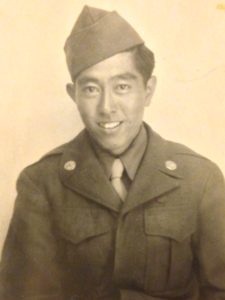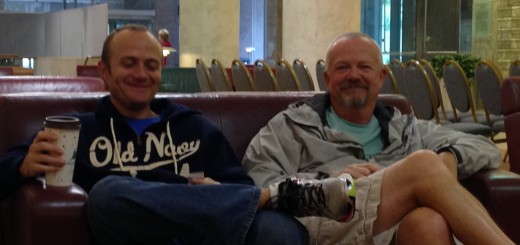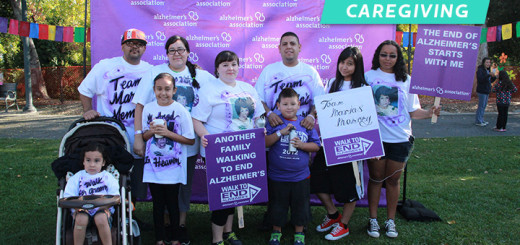Bay Area Volunteer Shares Experience and Caregiving Insights

Trisha’s father, Tets Makimoto
Trisha Makimoto is a first-year committee member for the San Jose Walk to End Alzheimer’s. Her father, Tets Makimoto, has Alzheimer’s.
How has your family been impacted by Alzheimer’s?
I will admit that I was hesitant to share my story, at first. I just didn’t think it was very interesting but I came to realize that in a lot of ways, all of us who have been affected by Alzheimer’s, share a common bond and I hope that telling my story helps to make someone else feel less alone in their struggle. I know that we have to talk about this and we have to fight for a cure together.
My family has been greatly impacted by Alzheimer’s. My father suffers from Alzheimer’s. My grandmother had dementia, I lost two aunts to this disease and I have a cousin who is now struggling with early-onset Alzheimer’s. It makes me a bit fearful about my future.
What have you learned from the experience so far?
Probably the most valuable lesson that I have learned from this experience is that you need to be prepared. While nobody can predict the future – it is important to talk to your loved ones about their wishes and to know what they are able to do, financially speaking. It’s hard but it is really better than not knowing. It just prevents moments of panic later.
This is especially true with someone who has dementia or Alzheimer’s – talk to them while they are able to articulate what they want – that window of opportunity closes very quickly. We learned this the hard way. When my Mom was diagnosed with cancer, we knew that she really did not have too much time left so I think we went into overdrive, taking care of her and trying to learn all that we could in that short period of time but unfortunately, my Dad’s needs were somewhat pushed aside as we cared for Mom. We just thought we’d have more time with Dad. That is something I will always regret.
I have learned that some days are really hard. There is nothing worse than watching someone who was once so outgoing and full of life go though some really sad changes and indignities. Dad is at the stage where he can no longer hold a real conversation. More often than not, the things he is able to talk about really don’t make too much sense so we just go with it but it is still heartbreaking to see the look of frustration on his face when he can’t get his point across. I do have days where I feel overwhelmingly sad or really angry about all of this but I have learned to count my blessings. I try to see the small triumphs that Dad has – somedays he’ll say something really witty and we all get a good laugh – somedays he won’t say much at all, but if I get a smile out of him – then I call it a good day.
Do you have any advice for other caregivers who are in a similar situation?
This might sound a bit cliché, but my advice for other caregivers is to allow others to help and to ask for help. I hear of so many people who want so desperately to be the sole caregiver for their loved ones and while that is very admirable – it is not fair to the caregiver and it is certainly not fair to the person with Alzheimer’s. I saw this with my Mom. She did everything in her power to take care of Dad but in turn, sacrificed her already fragile health and it adversely affected their overall well-being and safety.
I understand the mindset and I do sometimes feel guilty that we put my Dad in assisted living but he is doing so much better than he would be if my sister or I had tried to take him into either of our homes. It was just not realistic for us to try to take care of him ourselves. We were fortunate to be able to have placed him somewhere where he’s being cared for and where he is safe. Before Mom passed away, we promised her that we would take care of Dad and I feel that we are fulfilling that promise by accepting help.
Another piece of advice is to try to find programs for your loved ones. We enrolled my Dad into the Live Oak Adult Day Services Program in Willow Glen. With that – I must say THANK YOU to Ana Jones and team! They are angels on Earth. I truly believe that the daily activity and socializing has helped to keep my Dad with us longer, cognitively speaking. He comes home with artwork that has shown me a side of my father that I didn’t know existed. I have learned that not all of the changes he is going through are necessarily bad. From the day that my Dad started in this program, he absolutely refused to dance with the ladies at Live Oak but Ana tells us that recently, he has made a complete turnaround and now gets up and joins in the fun! One small blessing – he forgot that he didn’t like to dance!
Medicare and most insurance don’t cover long term care in nursing homes, and many families are blindsided by this. What has your experience been?
My family and I learned about all of this when we started looking around for assisted living for my parents. We were shocked to hear that on average – it would cost over $10,000 a month to place someone into a memory care unit. We are fortunate that my parents were able to somewhat plan for their future but we know that the money will not last forever so we have learned that we need to be extremely diligent about looking for all of the resources out there to help defray the costs but realistically, there are not that many.
What made you volunteer at the Alzheimer’s Association?
I decided to volunteer after I did my first Walk to End Alzheimer’s last October. I was so uplifted. I felt such a sense of camaraderie. These were people who shared my experiences and had a common goal. I absolutely wanted to be more involved with these people and this cause. I signed up to volunteer right after the walk! I have not regretted one single moment – I have had the opportunity to attend a regional training event and the various committee meetings and I have never felt so welcome. The staff at the Alzheimer’s Association and the other volunteers have been amazing. I first learned about the Walk through Live Oak. I was on their team last year and this year I have formed a team at work – Team Synopsys – in hopes of garnering even more donations and exposure for the big event.
Helpful information related to this post:


















Hi Trisha,
Thank you so much for sharing your story. My mother has Alzheimer’s too and could relate to all that you wrote from a cultural aspect as well.
Hopefully in the future I might be able to join you in the San Jose walk…
Warmly,
Arlene Kikkawa-Nielsen
Thank you for sharing this
This was excellent sharing.